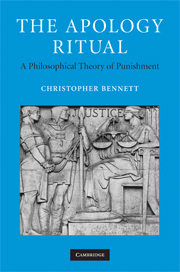4 - Non-retributive dialogue
Published online by Cambridge University Press: 22 September 2009
Summary
In the last chapter I developed a Strawsonian defence of individual responsibility. The idea I defended was that holding someone responsible in cases of violation was a necessary part of treating them as a fellow member of some valuable relationship. However, our inquiry in this book concerns the basis of retribution, and the criticism that we encountered at the end of the last chapter was that holding someone responsible is not the same as retribution. The retributive attitudes, we pointed out, require some further justification. Furthermore, we pointed out that it was by no means clear where such a justification could come from, at least if we are thinking in terms of the ‘right to be punished’ strategy that we are pursuing here. We respect someone's identity by engaging them in dialogue, not by making them suffer. Therefore if we are swayed by the arguments in favour of individual responsibility that we developed in the last chapter then non-retributive dialogue could be an attractive basis for some form of justice.
In this chapter I want to develop two models of non-retributive restorative justice. Restorative justice is a kind of ‘deliberative justice’: it centres on a kind of conversation between the offender and other interested parties, often including the victim. Over the next two chapters we will be trying to work out an adequate conception of this conversation.
- Type
- Chapter
- Information
- The Apology RitualA Philosophical Theory of Punishment, pp. 74 - 100Publisher: Cambridge University PressPrint publication year: 2008



